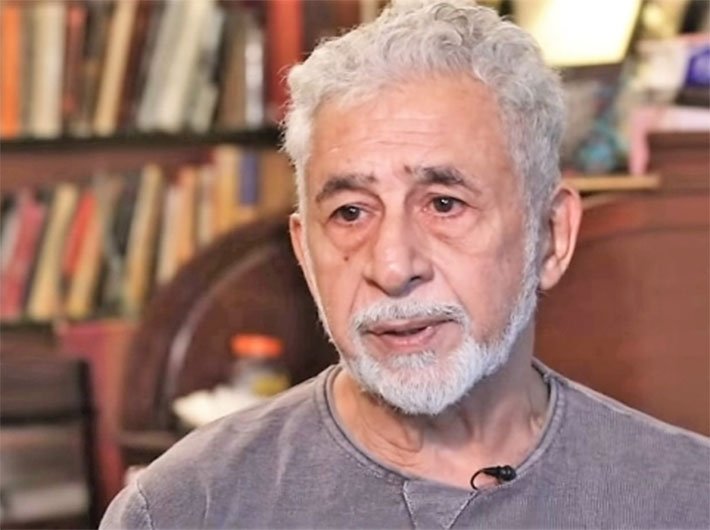In UP if you keep yourself on the right side of law, you may end up on the wrong side of a bloodthirsty mob
Naseeruddin Shah is not just a Bollywood star; he is a rarity – a thinking actor. His dialogues delivered with impeccable diction drive home the point without any element of melodrama. IN the same measured voice, he is often known for speaking his mind. And there is little doubt that he uses his clarity of thought and oratory to convey social and political messages that often trigger controversy.
We have listened to Shah’s voice in movies. The manner in which he essayed a difficult role in the movie ‘Wednesday’ and delivered a small but stirring speech towards the climax on vitiated social atmosphere in India won accolades. Though his role promoted a degree of anarchic violence to correct the malaise of hatred and terrorism, he was heard in appreciation. And there is no reason why he should not be heard now.
In a video shared on social-media platforms this week, he has said, “I am anxious about my children … because they don’t have any religion. Tomorrow if a mob surrounds them and asks them their religion, they will have no answer.” Moreover, “There is complete freedom to take law into one’s own hands. In some areas we see the killing of a cow receiving more importance than the lynching of a police officer.”
What Shah has said in the context of the December 3 killing of police inspector Subodh Kumar Singh and local youth Sumit Kumar in Bulandshahr and UP chief minister Yogi Adityanath’s reaction to it makes eminent sense. The killing of a police inspector in mob violence is nothing new. But the Bulandshahr case is entirely different.
The manner in which there was an attempt to foment trouble on the pretext of cow-killing was premeditated. That Subodh Kumar Singh was killed for fearlessly attending to the call of duty is chilling. He was a police officer whose only fault was his refusal to kowtow to a lynch mob. That he was a Hindu should be incidental. Had he been killed for his religion, it would have been categorised as the result of communal hatred. But his killing was the result of the mob’s hatred against rule of law. This pathology of violence is radically different from violence in the name of caste or community.
For the first time there is a genuine fear in Uttar Pradesh that if you keep yourself on the right side of law, you may end up on the wrong side of a bloodthirsty mob. And the result is gruesome. In the recent past this trend has gained momentum across the state. As a reporter who covered a series of communal riots in Uttar Pradesh and Bihar extensively since the eighties, I have never faced such a pervert political situation in which the discourse is oriented to promote violence and lawlessness to eliminate obstacles in the path of mob fury. More often the level of discourse goes so down that it appears that the mob violence is aligned with political objective.
Let me recount my personal experience to explicate what I am trying to say. At the height of the Ayodhya agitation in the wintry cold of November in 1990, I along with a Muslim colleague encountered a restive Hindu mob in Chowk area of Lucknow. My colleague was surrounded by people full of anger against Muslims neighbours, and yet he did not have to bother to hide his religious identity. He remained safe. Covering the Aligarh riots in the same year, I entered a dense Muslim locality in Upper Koat area, and I too did not have to conceal my identity. Hundreds of local residents who were infuriated by the police action met me and discussed a wide range of issues without showing any inclination to harm me. Perhaps the professional identity – a reporter – was a sufficient insurance.
That does not appear to be the case now. There are stories of people confronted in markets and asked to prove their patriotic credentials by shouting the slogan of “Bharat Mata Ki Jai”. Mobs are roaming around, assuming the roles of the prosecutor and the jury and delivering instant justice. They seem to be driven by basest human impulses of violence and hubris. Look at the manner in which Yogi Adityanath has been discovering pretext after pretext to explain away the wanton killing in Bulandshahr. His immediate reaction was that the police inspector and a youngster’s murder was merely an accident, but now he smells a full-fledged conspiracy.
Naseeruddin Shah’s outburst in such a situation must be taken as a genuine beginning of a healthy debate. To find him guilty of partisanship – as some trolls have alleged – would be like killing the messenger without checking the message.
Historically it is the responsibility of the social elite to conduct the discourse in a manner that it does not degrade into an orgy of anarchy and malevolence. Mahatma Gandhi called off his 1922 Noncooperation Movement after the Chauri Chaura violence. He outright rejected even a semblance of violence as a means to achieve even the noblest political objective. He was ably assisted by stalwarts of his time to let the political discourse flow at a civilised level to ensure the foundation of a civilised and democratic society.
In one of his essays, British political scientist Michael Oakeshott attributed the man’s present appearance to his descent from apes and his ability to sit and talk “so long and so late that they wore out their tales”. Perhaps Shah’s remarks should be taken in stride to initiate – to borrow Oakeshott’s phrase – “an unrehearsed intellectual adventure” to correct the course of discussion unencumbered by prejudices to reflect the nation’s true spirit.
[This comment has appeared on FirstPost.com]



